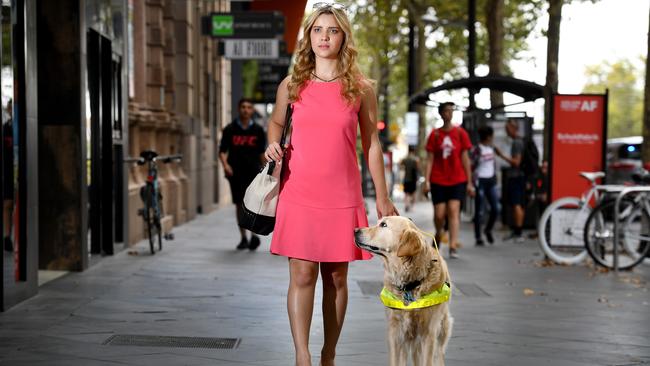RSB calls for national card for guide dog owners to save them being refused entry
A national government-issued card should be created for guide dog owners to avoid situations where they are wrongly prohibited from entering a premises or refused public transport, the Royal Society for the Blind says.

SA News
Don't miss out on the headlines from SA News. Followed categories will be added to My News.
- Rachael Leahcar refused Uber ride because of guide dog
- Ellen Fraser-barbour and her dog refused entry to restaurant
A national government-issued card should be created for guide dog owners to avoid situations where they are wrongly prohibited from entering a premises or refused public transport, the Royal Society for the Blind says.
The not-for-profit organisation is calling for a Senate inquiry into a national accreditation and registration scheme for assistance dogs.
It comes after an Uber driver last week refused to pick up legally blind Adelaide singer Rachael Leahcar while she was with her guide dog Ella.
RSB Guide and Assistance Dog manager Lindy Hennekam said Ms Leahcar’s predicament could have been prevented if she’d been able to produce formal accreditation.
“Rachael’s situation with Uber is a classic example of how a national registration framework could assist,” she said.
“Uber themselves have very clear and correct policies in this space, but they will always get the occasional driver who gets it wrong.
“If Rachael has been able to present formal accreditation identification that confirmed the legal access of the dog, then I suspect the driver may have made a different decision.”

The proposed Senate inquiry would provide states, territories, disability advocacy groups, businesses and individuals with assistance dogs an opportunity to have their say on a national framework.
The creation of assistance dog identification cards and possible penalties for refusing entry to a person with an guide dog would be discussed in the inquiry.
Lead Centre Alliance Senate candidate Skye Kakoschke-Moore, a former SA senator, said if she was voted in at the Federal Election, she would move for the senate inquiry “on my first day back in parliament”.
“The lack of consistency around assistance dog training and accreditation, coupled with inadequate public awareness about the rights of a person with an assistance dog, means experiences like Rachael’s are sadly not uncommon,” she said.
“If a national public access training and accreditation framework existed, then these kinds of situations could be avoided.”



